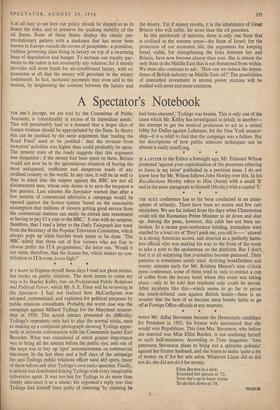IF I WANT to frighten myself these days I read
not ghost stories, but books on public relations. The most recent to come my way is by Stanley Kelley Jun. on Professional Public Relations and Political Power, which Mr. S. E. Finer will be reviewing in the Spectator. I had not realised how McCarthyism was adopted, systematised, and exploited for political purposes by public relations consultants. Probably the worst case was the campaign against Millard Tydings for the Maryland senator- ship in 1950. The actual smears presented no difficulty; Tydings's opponents only had to play the normal tricks, such as making up a composite photograph showing Tydings appar- ently in intimate conversation with the Communist leader Earl Browder. What was considered of much greater importance was to bring all the smears before the public eye; and one of the ways was to buy up 'spot' announcements on commercial television. In the last three and a half days of the campaign the anti-Tydings public relations officer used 465 spots, many of them before and after Tydings's own radio speeches. Finally, a tabloid was distributed linking Tydings with every imaginable subversive agent. It was too late for Tydings to do more than simply denounce it as a smear; his opponent's reply was that Tydings had himself been guilty of smearing 'by claiming he had been smeared.' Tydings was beaten. This is only one of the cases which Mr. Kelley has investigated in detail; in another— the attempt to get the medical profession to act as a united lobby for Dulles against Lehmann, for the New York senator- ship—it is a relief to find that the campaign was a failure. But the descriptions of how public relations techniques can be abused is really scarifying.


























 Previous page
Previous page